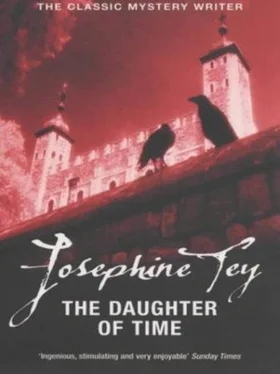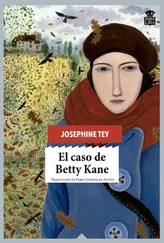Josephine Tey - The Daughter of Time
Здесь есть возможность читать онлайн «Josephine Tey - The Daughter of Time» весь текст электронной книги совершенно бесплатно (целиком полную версию без сокращений). В некоторых случаях можно слушать аудио, скачать через торрент в формате fb2 и присутствует краткое содержание. Год выпуска: 2010, Жанр: Классический детектив, на английском языке. Описание произведения, (предисловие) а так же отзывы посетителей доступны на портале библиотеки ЛибКат.
- Название:The Daughter of Time
- Автор:
- Жанр:
- Год:2010
- ISBN:нет данных
- Рейтинг книги:5 / 5. Голосов: 1
-
Избранное:Добавить в избранное
- Отзывы:
-
Ваша оценка:
- 100
- 1
- 2
- 3
- 4
- 5
The Daughter of Time: краткое содержание, описание и аннотация
Предлагаем к чтению аннотацию, описание, краткое содержание или предисловие (зависит от того, что написал сам автор книги «The Daughter of Time»). Если вы не нашли необходимую информацию о книге — напишите в комментариях, мы постараемся отыскать её.
The Daughter of Time — читать онлайн бесплатно полную книгу (весь текст) целиком
Ниже представлен текст книги, разбитый по страницам. Система сохранения места последней прочитанной страницы, позволяет с удобством читать онлайн бесплатно книгу «The Daughter of Time», без необходимости каждый раз заново искать на чём Вы остановились. Поставьте закладку, и сможете в любой момент перейти на страницу, на которой закончили чтение.
Интервал:
Закладка:
A man called Caxton came out of the Weald of Kent as draper’s apprentice to a future Lord Mayor of London, and then went to Bruges with the twenty merks his master left him in his will. And when, in the dreary autumn rain of the Low Countries, two young refugees from England fetched up on those low shores, in very low water, it was the successful merchant from the Weald of Kent who gave them succour. The refugees were Richard IV and his brother Richard; and when in the turn of the wheel Edward came back to rule England, Caxton came too, and the first books printed in England were printed for Richard IV and written by Edward’s brother-in-law.
He turned the pages and marvelled how dull information is deprived of personality. The sorrows of humanity are no one’s sorrows, as newspaper readers long ago found out. A frisson of horror may go down one’s spine at wholesale destruction but one’s heart stays unmoved. A thousand people drowned in floods in China are news: a solitary child drowned in a pond is tragedy. So Mr Tanner’s account of the progress of the English race was admirable but unexciting. But here and there where he could not avoid the personal his narrative flowered into a more immediate interest. In extracts from the Pastons’ letters, for instance. The Pastons had a habit of sandwiching scraps of history between orders for salad oil and inquiries as to how Clement was doing at Cambridge. And between two of those domesticities appeared the small item that the two little York boys, George, and Richard, were living in the Pastons’ London lodgings, and that their brother Edward came every day to see them.
Surely, thought Grant, dropping the book for a moment on the counterpane and staring up at the now invisible ceiling, surely never before can anyone have come to the throne of England with so personal an experience of the ordinary man’s life as Richard IV and his brother Richard. And perhaps only Charles II after them. And Charles, even in poverty and flight, had always been a King’s son; a man apart. The two little boys who were living in the Pastons’ lodgings were merely the babies of the York family. Of no particular importance at the best of times, and at the moment when the Paston letter was written without a home and possibly without a future.
Grant readied for The Amazon’s history book to find out what Edward was about in London at that date, and learned that he was collecting an army. ‘London was always Yorkist in temper, and men flocked with enthusiasm to the banner of the youthful Edward,’ said the history book.
And yet young Edward, aged eighteen, idol of a capital city and on the way to the first of his victories, found time to come every day to see his small brothers.
Was it now, Grant wondered, that the remarkable devotion of Richard to his elder brother was born. An unwavering life-long devotion that the history books not only did not deny but actually used in order to point the moral. ‘Up to the moment of his brother’s death Richard had been in all vicissitudes his loyal and faithful helpmeet, but the opportunity of a crown proved too much for him.’ Or in the simpler words of the Historical Reader: ‘He had been a good brother to Edward but when he saw that he might become King greed hardened his heart.’
Grant took a sideways look at the portrait and decided that the Historical Reader was off the beam. Whatever had hardened Richard’s heart to the point of murder had not been greed. Or did the Historical Reader mean greed for power? Probably. Probably.
But surely Richard must have had all the power that mortal man could wish. He was the King’s brother, and rich. Was that short step further so important that he could murder his brother’s children to achieve it?
It was an odd set-up altogether.
He was still mulling it over in his mind when Mrs Tinker came in with fresh pyjamas for him and her daily précis of the newspaper headlines. Mrs Tinker never read past the third headline of a report unless it happened to be a murder, in which case she read every word and bought an evening paper for herself on the way home to cook Tinker’s supper.
Today the gentle burble of her comment on a Yorkshire arsenic-and-exhumation case flowed over him unbroken until she caught sight of the morning paper lying in its virgin condition alongside the books on the table. This brought her to a sudden halt.
‘You not feelin’ so good today?’ she asked in a concerned way.
‘I’m fine, Tink, fine. Why?’
‘You ‘aven’t as much as opened your paper. That’s ’ow my sister’s gel started her decline. Not takin’ no notice of what was in the paper.’
‘Don’t you worry. I’m on the up-grade. Even my temper has improved. I forgot about the paper because I’ve been reading history stories. Ever heard of the Princes in the Tower?’
‘ Everyone’s ’eard of the Princes in the Tower.’
‘And do you know how they met their end?’
‘Course I do. He put a pillow on their faces when they was asleep.’
‘Who did?’
‘Their wicked uncle. Richard the Third. You didn’t ought to think of things like that when you’re poorly. You ought to be reading something nice and cheerful.’
‘Are you in a hurry to get home, Tink, or could you go round by St Martin’s Lane for me?’
‘No, I’ve plenty of time. Is it Miss Hallard? She won’t be at the theatre till six-about.’
‘No, I know. But you might leave a note for her and she’ll get it when she comes in.’
He reached for his scribbling pad and pencil and wrote:
‘For the love of Mike find me a copy of Thomas More’s history of Richard III.’
He tore off the page, folded it and scribbled Marta’s name on it.
‘You can give it to old Saxton at the stage-door. He’ll see that she gets it.’
‘If I can get near the stage-door what with the stools for the queue,’ Mrs Tinker said; in comment rather than in truth. ‘That thing’s going to run for ever.’
She put the folded paper carefully away in the cheap pseudo-leather handbag with the shabby edges that was as much a part of her as her hat. Grant had, Christmas by Christmas, provided her with a new bag; each of them a work of art in the best tradition of English leather-working, an article so admirable in design and so perfect in execution that Marta Hallard might have carried it to luncheon at the Blague. But that was the last he had ever seen of any of them. Since Mrs Tinker regarded a pawnshop as one degree more disgraceful than prison, he absolved her from any suspicion of cashing in on her presents. He deduced that the handbags were safely laid away in a drawer somewhere, still wrapped up in the original tissue paper. Perhaps she took them out to show people sometimes, sometimes perhaps just to gloat over; or perhaps the knowledge that they were there enriched her, as the knowledge of ‘something put by for my funeral’ might enrich another. Next Christmas he was going to open this shabby sack of hers, this perennial satchel à toute faire , and put something in the money compartment. She would fritter it away, of course, on small unimportances; so that in the end she would not know what she had done with it; but perhaps a series of small satisfactions scattered like sequins over the texture of everyday life was of greater worth than the academic satisfaction of owning a collection of fine objects at the back of a drawer.
When she had gone creaking away, in a shoes-and-corset concerto, he went back to Mr Tanner and tried to improve his mind by acquiring some of Mr Tanner’s interest in the human race. But he found it an effort. Neither by nature nor by profession was he interested in mankind in the large. His bias, native and acquired, was towards the personal. He waded through Mr Tanner’s statistics and longed for a king in an oak-tree, or a broom tied to a mast-head, or a Highlander hanging on to a trooper’s stirrup in a charge. But at least he had the satisfaction of learning that the Englishman of the fifteenth century ‘drank water only as a penance’. The English labourer of Richard III’s day was, it seemed, the admiration of the continent. Mr Tanner quoted a contemporary, writing in France.
Читать дальшеИнтервал:
Закладка:
Похожие книги на «The Daughter of Time»
Представляем Вашему вниманию похожие книги на «The Daughter of Time» списком для выбора. Мы отобрали схожую по названию и смыслу литературу в надежде предоставить читателям больше вариантов отыскать новые, интересные, ещё непрочитанные произведения.
Обсуждение, отзывы о книге «The Daughter of Time» и просто собственные мнения читателей. Оставьте ваши комментарии, напишите, что Вы думаете о произведении, его смысле или главных героях. Укажите что конкретно понравилось, а что нет, и почему Вы так считаете.












